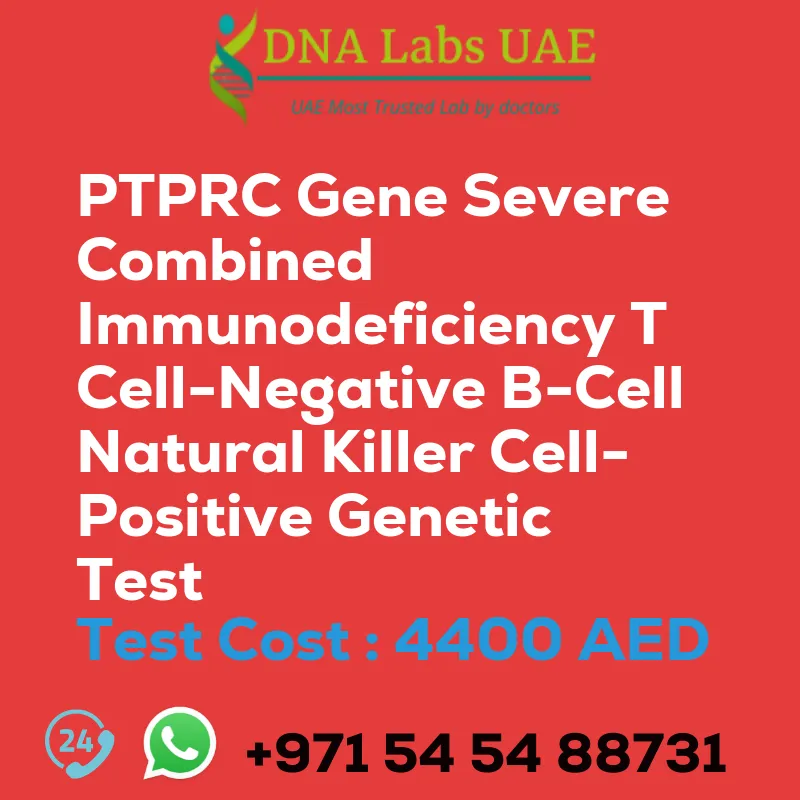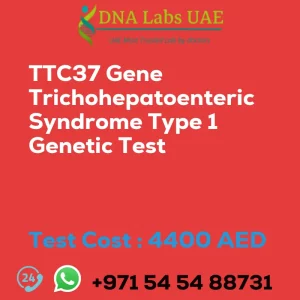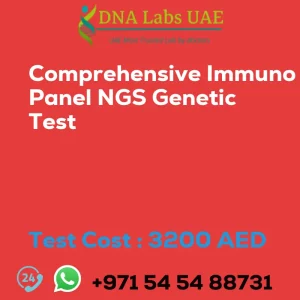PTPRC Gene Severe combined immunodeficiency T cell-negative B-cellnatural killer-cell positive Genetic Test
Introduction
Severe combined immunodeficiency (SCID) is a rare genetic disorder characterized by a severely compromised immune system, making affected individuals highly susceptible to infections. The PTPRC gene, also known as CD45, is associated with SCID that manifests as a T cell-negative, B-cell/natural killer (NK)-cell positive phenotype.
Test Details
The PTPRC Gene Severe combined immunodeficiency T cell-negative B-cellnatural killer-cell positive Genetic Test is a next-generation sequencing (NGS) genetic test that analyzes the DNA sequence of the PTPRC gene. The test can identify mutations or variants in the gene that may be responsible for the T cell-negative, B-cell/NK-cell positive phenotype.
Components
- Price: 4400.0 AED
- Sample Condition: Blood or Extracted DNA or One drop Blood on FTA Card
- Report Delivery: 3 to 4 Weeks
- Method: NGS Technology
- Test type: Osteology Dermatology Immunology Disorders
- Doctor: Dermatologist
- Test Department: Genetics
Pre Test Information
Before undergoing the PTPRC Gene Severe combined immunodeficiency T cell-negative B-cellnatural killer-cell positive Genetic Test, it is important to provide the clinical history of the patient. Additionally, a genetic counseling session may be conducted to draw a pedigree chart of family members affected with SCID and the PTPRC gene mutation.
Importance of NGS Genetic Testing
NGS genetic testing is a powerful tool in the field of genetics and can provide valuable insights into the genetic basis of various diseases, including immunodeficiencies like SCID. By analyzing the DNA sequence, NGS can detect changes in the PTPRC gene that may disrupt its normal functioning. This information can help in diagnosing SCID and understanding its underlying genetic cause.
However, it is crucial to note that genetic testing should always be performed and interpreted by qualified healthcare professionals who specialize in genetics.
| Test Name | PTPRC Gene Severe combined immunodeficiency T cell-negative B-cellnatural killer-cell positive Genetic Test |
|---|---|
| Components | |
| Price | 4400.0 AED |
| Sample Condition | Blood or Extracted DNA or One drop Blood on FTA Card |
| Report Delivery | 3 to 4 Weeks |
| Method | NGS Technology |
| Test type | Osteology Dermatology Immunology Disorders |
| Doctor | Dermatologist |
| Test Department: | Genetics |
| Pre Test Information | Clinical History of Patient who is going for PTPRC Gene Severe combined immunodeficiency, T cell-negative, B-cell/natural killer-cell positive NGS Genetic DNA Test. A Genetic Counselling session to draw a pedigree chart of family members affected with PTPRC Gene Severe combined immunodeficiency, T cell-negative, B-cell/natural killer-cell positive NGS Genetic DNA Test gene PTPRC |
| Test Details |
The PTPRC gene, also known as CD45, is associated with severe combined immunodeficiency (SCID) that is characterized by T cell-negative, B-cell/natural killer (NK)-cell positive phenotype. SCID is a group of rare genetic disorders that result in a severely compromised immune system, making affected individuals highly susceptible to infections. Next-generation sequencing (NGS) genetic testing is a method used to analyze the DNA sequence of genes. In the context of SCID, NGS genetic testing can be used to identify mutations or variants in the PTPRC gene that may be responsible for the T cell-negative, B-cell/NK-cell positive phenotype. By analyzing the DNA sequence, NGS can detect changes in the PTPRC gene, such as deletions, insertions, or point mutations, that may disrupt the normal functioning of the gene. This information can help in diagnosing SCID and understanding its underlying genetic cause. NGS genetic testing is a powerful tool in the field of genetics and can provide valuable insights into the genetic basis of various diseases, including immunodeficiencies like SCID. However, it is important to note that genetic testing should always be performed and interpreted by qualified healthcare professionals who specialize in genetics. |








